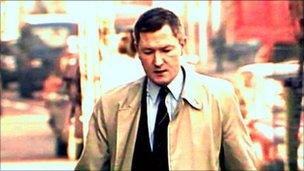Pat Finucane's murder was one of NI's most controversial killings
- Published

Pat Finucane represented some high profile republicans
The murder of Belfast solicitor Pat Finucane in February 1989 was without doubt one of the most controversial killings during the Troubles.
It was not only the brutality of the Ulster Freedom Fighters attack - the lawyer was shot 14 times in front of his wife and three children whilst the family sat at the dinner table in their north Belfast home - it was also the high profile of Pat Finucane and the immediate suspicion that elements in the security forces had colluded with his loyalist paramilitary killers.
Mr Finucane represented clients, such as IRA hunger strikers, and families involved in shoot to kill allegations against the police.
The year before he died he defended the former hunger striker Pat McGeown, charged with helping organise the murder of two Army corporals who drove into an IRA funeral cortege in west Belfast.
Mr Finucane succeeded in getting the charges against his client dropped.
However it's claimed a double agent passed a photograph of the solicitor taken outside the court to the UFF gunman who carried out his murder.
The double agent was Brian Nelson, who compiled information on potential targets for the UFF whilst at the same time working for British army intelligence.
The gunman was Ken Barrett, who later told the BBC Panorama programme he had carried out 10 loyalist murders.
Targeted
Barrett was found guilty of Pat Finucane's murder in 2004.
Two years previously he told Panorama's John Ware, in a secretly recorded conversation, that a police officer had suggested he target the lawyer.
"To be honest," claimed Barrett, "Finucane would have been alive today if the peelers hadn't interfered... solicitors were kind of way taboo, if you know what I mean? We used a lot of Roman Catholic solicitors ourselves, they were taboo.. you didn't touch them."
Admitting his murder, the UFF claimed the lawyer was an IRA officer.
Three of his brothers were in the IRA, but the Finucane family has always insisted the solicitor was not an IRA member and had been targeted purely because of his dedication to his legal work.
The solicitor's son, Michael Finucane, described the claim as "an insult" saying his killers' "limited mentality did not stretch to differentiating between the role of the lawyer and the offence suspected of the client".
Charges related to the murder had also previously been brought against another loyalist and Special Branch agent William Stobie, suspected of supplying the guns used in the attack.
The case against Stobie collapsed in 2001, but he didn't live long to enjoy his freedom - within weeks loyalist gunmen shot him dead.
Although the former Metropolitan police chief Lord Stevens found there was collusion in the murder, Pat Finucane's family always insisted only a full inquiry would determine how high up the chain of command responsibility ran.
The case featured in the negotiations on restoring devolution at Stormont and Tony Blair promised to set up an inquiry.
However the Finucane family believed the law under which it would operate - the 2005 Inquiries Act - would enable the government to interfere and suppress unwelcome details.
The Northern Ireland Secretary Owen Paterson engaged in talks with the family to try to resolve the stand off.
However, David Cameron's offer of a senior lawyer to review the case papers, far from resolving the matter appears to have only deepened the rift between the Finucanes and Number 10.